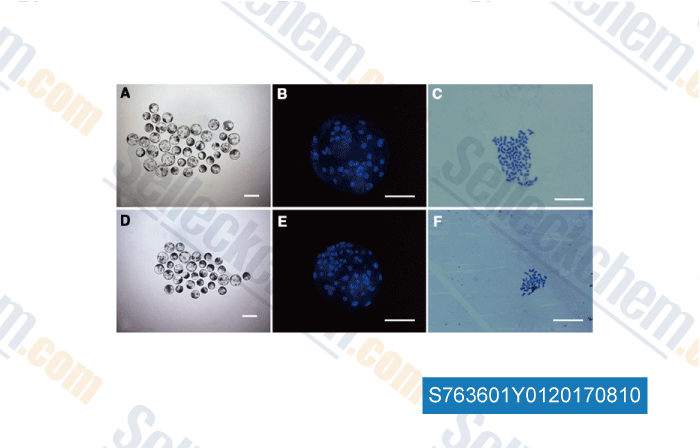|
Toll Free: (877) 796-6397 -- USA and Canada only -- |
Fax: +1-832-582-8590 Orders: +1-832-582-8158 |
Tech Support: +1-832-582-8158 Ext:3 Please provide your Order Number in the email. |
Technical Data
| Formula | C13H11N3O2 |
|||
| Molecular Weight | 241.25 | CAS No. | 377090-84-1 | |
| Solubility (25°C)* | In vitro | DMSO | 48 mg/mL (198.96 mM) | |
| Ethanol | 12 mg/mL (49.74 mM) | |||
| Water | Insoluble | |||
|
* <1 mg/ml means slightly soluble or insoluble. * Please note that Selleck tests the solubility of all compounds in-house, and the actual solubility may differ slightly from published values. This is normal and is due to slight batch-to-batch variations. * Room temperature shipping (Stability testing shows this product can be shipped without any cooling measures.) |
||||
Preparing Stock Solutions
Biological Activity
| Description | SU 9516 is a 3-substituted indolinone CDK inhibitor with IC50 of 22 nM, 40 nM, and 200 nM for CDK2, CDK1, and CDK4, respectively. | ||||||
|---|---|---|---|---|---|---|---|
| Targets |
|
||||||
| In vitro | SU9516 decreases cdk2-specific phosphorylation of the retinoblastoma protein pRB, increases caspase-3 activation, and alters cell cycle in RKO and SW480 cells. SU9516 also inhibits the cell proliferation, and induces cell apoptosis in both cell lines. [1] SU9516 kills leukemic cells through inhibition of RNA Pol II CTD phosphorylation, oxidative damage and transcriptional down-regulation of Mcl-1. [2] In human T-cell leukemia Jurkat cells, SU9516 significantly enhances sensitivity to methotrexate. [3] In addition, SU9516 also suppresses Aurora-A centrosomal localization and consequent centrosome amplification. [4] |
Protocol (from reference)
| Kinase Assay:[1] |
|
|---|---|
| Cell Assay:[1] |
|
References
Customer Product Validation

-
Data from [Data independently produced by , , Biotechnol Lett, 2017, 39(7):951-957]
Selleck's SU9516 has been cited by 4 publications
| Inactivation of TACC2 epigenetically represses CDKN1A and confers sensitivity to CDK inhibitors [ Med, 2025, S2666-6340(24)00482-3] | PubMed: 39793578 |
| Tip60-mediated H2A.Z acetylation promotes neuronal fate specification and bivalent gene activation [ Mol Cell, 2022, S1097-2765(22)01064-4] | PubMed: 36417913 |
| Differences in the Conformational Energy Landscape of CDK1 and CDK2 Suggest a Mechanism for Achieving Selective CDK Inhibition [ Cell Chem Biol, 2019, 26(1):121-130] | PubMed: 30472117 |
| CDK inhibitor SU9516 induces tetraploid blastocyst formation from parthenogenetically activated porcine embryos. [Guo Q, et al. Biotechnol Lett, 2017, 39(7):951-957] | PubMed: 28315059 |
RETURN POLICY
Selleck Chemical’s Unconditional Return Policy ensures a smooth online shopping experience for our customers. If you are in any way unsatisfied with your purchase, you may return any item(s) within 7 days of receiving it. In the event of product quality issues, either protocol related or product related problems, you may return any item(s) within 365 days from the original purchase date. Please follow the instructions below when returning products.
SHIPPING AND STORAGE
Selleck products are transported at room temperature. If you receive the product at room temperature, please rest assured, the Selleck Quality Inspection Department has conducted experiments to verify that the normal temperature placement of one month will not affect the biological activity of powder products. After collecting, please store the product according to the requirements described in the datasheet. Most Selleck products are stable under the recommended conditions.
NOT FOR HUMAN, VETERINARY DIAGNOSTIC OR THERAPEUTIC USE.
